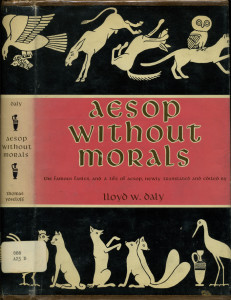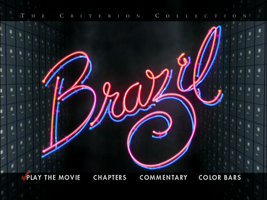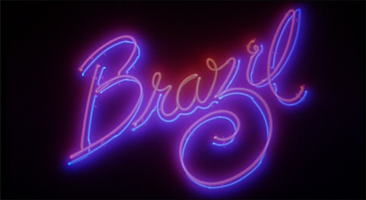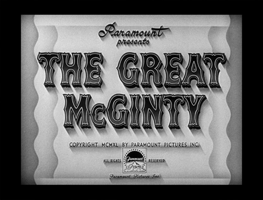
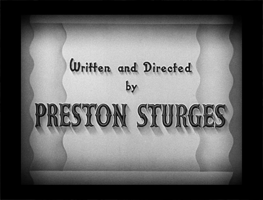
Winner in the category of WRITING (Original Screenplay) at the 13th Academy Awards, presented February 27, 1941 at the Biltmore Bowl, Biltmore Hotel.
The other nominees were:
Angels over Broadway — Ben Hecht
Dr. Ehrlich’s Magic Bullet — John Huston, Heinz Herald, Norman Burnside
Foreign Correspondent — Charles Bennett, Joan Harrison
The Great Dictator — Charles Chaplin
Opening of screenplay:
DOWN WENT McGINTY
SEQUENCE “A”
During the Main Titles we see a succession of shots of the harbor and waterfront of a banana republic. The last title is imposed over a NIGHT SHOT of a drinking establishment. Now we HEAR some rumba music and we TRUCK FORWARD SLOWLY TOWARD THE CAFE. At this point the following is imposed over the shot:
This story has no moral,
This story has no end,
This story only goes to show
There is no good in men.
DISSOLVE TO:
A-1A PRETTY RUMBA DANCER PERFORMING IN FRONT OF A BAND
We see a few customers IN THE FOREGROUND but they are not particularly interested. In other words, they give one look then turn away. Noticing the lack of interest she bends over and grabs her skirt.
First lines in film:
This is the story of two men who met in a banana republic. One of them was honest all his life except one crazy minute. The other was dishonest all his life except one crazy minute. They both had to get out of the country.
— Tommy?
— Mm?
— You buy me a drink, Tommy?
— Okay… Sure…
[During the original run, several newspapers around the country ran this unattributed pseudo-review, which makes reference to the original “This story has no moral” text (a quote from “Frankie and Johnny“). At first I thought this meant the opening titles had been changed some time after the original release, but on reflection, since this “review” seems to be studio promotional copy, we can deduce that either the PR department worked from the screenplay rather than the finished film, or that the titles were changed late in the game.]
ADAM Welcome all! To the next ten years of your life. What an odd movie.
BROOM Regarding the next ten years of my life: I found this exciting. It was certainly very odd but also very stimulating. Following the Best Original Screenplay and taking a writing-oriented approach to movies feels like a very exciting field of stuff to explore. I like dipping into this world. It’s interesting to watch an “interesting” screenplay!
ADAM I don’t mean to be down on the concept. But eternity is very heavy. You’re much more accustomed to taking on big projects than I am.
BROOM We’re allowed to quit in the middle. We’re not actually locked into something where it’s important to contemplate the extent of it. But to the degree that I was contemplating the extent of it, I felt excited. This feels like an alternate history of movies. Because this is certainly not an essential on anyone’s canonical history of movies. And yet it’s interesting to imagine that it could have been, could be.
BETH Did you both find yourself thinking more about writing than about other aspects of the movie? I think I did.
ADAM Yeah, because it was unexceptional in all other aspects.
BROOM I think it was written to be that way. And I think that’s what we’ll find, that the “Best Screenplay” winners are often screenplay-centric movies. It wasn’t “unexceptional” in any bad way; it generally had nice fluent direction.
ADAM No no, it was a perfectly… craftsmanlike movie in its cinematography and its look and those sorts of things. But it was an interesting script.
BROOM Actually I don’t know in the history of film whether that’s true; it used some distinctive devices visually and I don’t know where we are in the history of those devices.
BETH That’s one of the things that I was thinking: I wish that we could all call on a vast knowledge of filmmaking and screenwriting so that we could compare and mark where we are in the progress of the art. Like, was he the first person to use… certain turns of phrase or ways of speaking? I don’t think so. I noticed a lot of people saying, “da da da da da, see?” But that was clearly part of movies before this.
BROOM I think see? was just idiomatic at the time.
BETH Just a way of speaking. But I don’t know how movies have influenced cultural speech patterns.
ADAM Right. I’ve never met a gangster. I think we’ll probably see some more gangsters later on in this series.
BROOM Wasn’t this boss sort of like the boss in The Great Gatsby?
ADAM Meyer Wolfsheim.
BROOM Yeah. But this guy was Russian.
ADAM He was Italian I thought.
BROOM He was speaking Russian on the phone. [ed.: The character and performance was reportedly a model for Boris Badenov]
ADAM Oh, I thought he was meant to seem like a fat Italian guy.
BROOM He was also like the Italian boss in Miller’s Crossing. I sensed that the Coen brothers have studied Preston Sturges and this movie.
ADAM Why do you say that?
BROOM The strange rhythms. The charm of weird comic details intruding on the flow of the story.
BETH It was the most cartoonish serious movie I’ve ever seen. The Three Stooges have elements like this, like crazy fights in the back seat of a car, but no serious movie I’ve ever seen has stuff like that.
ADAM Yeah, no prestige drama from the 2000s has that kind of thing in it.
BETH Legs flying everywhere.
ADAM Or the totally gratuitous scene where he falls on the dishware.
BROOM In that scene with the legs flying around the back seat of the car, the foreground cuts to the front seat of the car where the driver is having a hilariously contentless conversation about “so I says so then she says…” Which is like a Simpsons joke. In the Preston Sturges Wikipedia entry there’s reference to Simpsons writers who claim him as an influence. It also seems like a Coen brothers gag, to inject something stupidly mundane.
ADAM I liked when he inadvertently opened the door to the linen closet.
BROOM For no particular reason in that particular scene. That’s what made the movie so charming: this playful attitude toward itself.
ADAM It seemed like it was going to be a crime/Casablanca caper, and then it turned into this serious women’s picture melodrama by the second half.
BETH Kind of… except I didn’t think any of the melodrama elements worked. They all fell flat. Her sadness felt fake to me.
BROOM I felt neither way. I didn’t think it was trying to be a women’s picture…
ADAM “Women’s picture” is not the right term. It turned into sort of a political melodrama about good government…
BETH It turned moralistic.
BROOM Over the course of the movie we went to a lot of different places. I’m not sure it was turning from one thing into another so much as just being extremely heterogeneous the whole time.
ADAM I didn’t get the framing device at all.
BETH It was: “You’re gonna kill yourself, pal? Let me tell you how I completely shat on my life and am still around to tell it.”
ADAM But what was the deal with that guy? Just that he was a cashier and he stole something?
BROOM Yeah.
ADAM Okay.
BROOM The opening text said it was about two people who meet: one who was honest his whole life except for one crazy minute and one who was dishonest except for one crazy minute. In retrospect we see that the movie isn’t really about the honest guy. The text is just supposed to clue us in to seeing the overall concept of this movie as being an inversion of a standard movie plot, where a person who is moral is eventually tempted to immorality and then experiences a downfall. Whereas the big picture of this movie is that it’s a fable about someone who is a crook his whole career and then experiences a downfall when he decides to try to be moral.
ADAM I guess I misunderstood that intro text, because I thought the “banana republic” they were referring to was Chicago. So I kept waiting for the other guy to appear in the story. I was confused when he didn’t. I assume this was supposed to take place in Chicago.
BROOM It seemed like it, but I don’t think they said where it was.
ADAM Didn’t we read that Preston Sturges was from Chicago?
BROOM Oh yeah. That makes sense.
ADAM And they had aldermen. That’s why I thought that.
BROOM I see. Yeah, I think the concept that was supposed to unite the many different elements was that it was a satirical inversion of a moralist rise and fall story.
ADAM At the beginning it was like it was winking: “There are no good guys here!” and it was sort of fun. And then suddenly it grew a conscience halfway through, and it was awkward.
BROOM But if you think about the ultimate “moral” of it, he accomplished absolutely no actual good, in the end. It was just about his downfall.
ADAM But it was all in good fun, in the first half, and then all of a sudden it got serious.
BROOM Did it?
BETH I don’t know that it did. It seemed like it needed to because the story required it.
BROOM I thought it was playing at seriousness, but with the same kind of distance. I thought there was something charming about the romance, not because they themselves embodied romantic charm but because they were being thrust through these absurdist circumstances. It was like the romance of falling in love while being in a cartoon, alone together. “We seem to be in a cartoon, and it’s just you and me here, honey.” And I thought that was the charm of the whole movie, that it was craziness but distanced. And then there was sort of a genuinely absurdist approach to these moral issues. “I guess you should clean up the tenements and the sweatshops or something!” He doesn’t actually do that; no-one in the movie does anything like that.
ADAM But she was kind of an operator too, at the beginning. Then all of a sudden she got all serious. It was strange to me. And she had a boyfriend on the side? Her character was more interesting than anyone else’s, but she got kind of preachy by the end in a way that I thought was… ill-worn.
BROOM But don’t you think I’m right that the basic way that the movie wanted us to understand it was as the negative image of a normal moralistic movie? And that’s why it ended that way: “here they go again!”
BETH I do think that’s right.
ADAM But it kept making stabs at having a serious human love interest between them, and a serious human interest in his children, and then all of a sudden — [(wonk) sound]!: dishes crashing on the floor as they’re wrestling! She and the kids disappear and are never seen again!
BROOM At the very end.
ADAM Yes, at the very end, but… are we supposed to go back to winking and guffawing? I guess so. But then what was all the seriousness about if the movie didn’t really mean it?
BROOM It does definitely leave you with a puzzle as to how much you’re supposed to feel.
BETH How much to care. Yeah.
BROOM But then I think about how as a kid, I knew that the answer was that you’re not really supposed to care about anything. “As much as you want!” is how much. And I felt well-treated, in terms of the movie saying: “Here, have some fun. Have whatever kind of fun you want.” I had whatever kind of fun I wanted.
ADAM It definitely had a sort of lumpiness to it that was appealing. Not only was it not formulaic, but even being unformulaic, it wasn’t perfectly well reasoned in a way that was satisfying. Like why was there the little digression at the end where he gets upset about how child labor is actually fine and he worked in a factory and it kept him off the street?
BROOM And then she says, “Oh, you’re impossible!”
ADAM That didn’t really make any sense in terms of the plot. I mean, it was sort of interesting and human, sort of appealing, but it didn’t actually make any sense.
BROOM Yes, it wasn’t very schematic — except for this big scheme of being upside-down. Every time I got worried that it was going to turn genuinely political — “Uh-oh, is this gonna be anti-government? Is it going to be anti-this or that?” — he would just screw it up so that it didn’t add up to a position. So there was no way for me to stay worried.
BETH I think that story about working in the factory is supposed to show you that he’s not taking sides here.
ADAM He Preston Sturges.
BETH Yeah: “I don’t actually care about this political stuff.”
BROOM Well, I think he cared insofar as for his purposes “cleaning up tenements” and “ending child labor” was supposed to immediately register as “good” and the audience was supposed instantly recognize that stuff as real morality.
ADAM Right. This movie was basically Dave but with a sad ending.
BETH Interesting. Yeah, a little bit.
BROOM I don’t remember how Dave worked.
BETH Dave looks like the president…
BROOM Kevin Kline?
ADAM Yeah. They sub him in to be the president because the president has had a heart attack while having sex with his mistress. And Kevin Kline is supposed to be the tool of this political operator, but then he says, “What are you talking about? Everyone thinks I’m the president!” and stiffs him and goes on to actually do good.
BROOM And Frank Langella is the vice president? Or is that a different movie?
ADAM I don’t remember.
BETH I don’t remember either.
ADAM And he courts the first lady, who realizes that he’s not the president, but they fall in love anyway.
BETH Sigourney Weaver, right?
ADAM Yeah.
BROOM Wow, that’s a long time. I only vaguely remember that movie. I’m surprised that you remember the premise being specifically that he’s had a heart attack while having sex with his mistress.
ADAM Well, it’s the source of the immortal line “the money’s on the dresser, chocolate.” Which my friends quote all the time.
BROOM I see! All right, you have a special exemption.
ADAM I believe that is from the movie Dave. I could be mistaken.
BROOM I’ll check it out.
ADAM Anyway, the point is, that movie has a light cynicism at the beginning that gets converted into optimism about the political process, because this rube who really had no business being in politics is able to clean house by virtue of his normal-guyness. Whereas here, this rube who has no business being in politics is unable to do any good by virtue of his normal-guyness, and just ends up in a cell next to the gangster.
BROOM Well, he’s unable to do any good because he’s completely and only a functionary of the gangster world. Not because he’s an ordinary guy. For a bum he’s pretty savvy: he’s able to play all these different people in different ways. But yes, he’s an ordinary guy as opposed to a career do-gooder.
ADAM He leaves Catherine so callously at the end!
BROOM Yup!
ADAM What are we supposed to…? It doesn’t all hang together emotionally for me, but it was interesting.
BROOM Yeah. It was some kind of wacky fable.
ADAM Now that I’m thinking about little setpieces that didn’t really make sense in the context of the whole thing, there were a lot of them that I liked. I liked his interaction with the fortune-teller lady. And I liked the fey little partner of the interior decorator. It didn’t make any sense, but it was fun. Or like the guy who’s collecting the vote tickets. He had a lot more personality than was really required for that role.
BROOM Yeah. Everything had a lot more personality than was required. “You can’t put a black king on a black queen.”
ADAM Right. There was a lot of surplusage that was satisfying. Which made the whole thing watchable even though…
BROOM Even though “why was it this story?”
ADAM Yeah.
BROOM I feel that there’s a kind of art to a thing that you cannot explain away in terms of some standard objective. I did not feel that this movie had a standard objective, and in that weirdness, it gave me the freedom to kinda just grin and wonder what I was watching. And I enjoyed that.
ADAM It also reminds me of The American President. Where the president is cynically proposing a gun-control bill…
BROOM Michael Douglas.
ADAM … that he knows is not gonna really make any difference, and then he meets this lobbyist and dates her, and she convinces him to go after the much more…
BROOM Annette Bening.
ADAM Thank you. Convinces him to pursue the climate change bill that is actually going to be much more influential even though he will have to give up the votes of these three congressmen from Michigan.
BROOM Moral MacGuffins.
ADAM Whatever. Just that she’s this virtuous unexpected lady influence who convinces him to reach for the gold, politically and morally. But that movie had a clear happy ending, an ordinary payoff, in a way that this didn’t. What’d you guys think of the acting?
BETH I thought it was fine.
ADAM I thought it was interesting that they were all really good even though I had never heard of them and will probably never see any of them ever again.
BROOM Apparently the main guy, Brian Donlevy, was a regular tough in film noir. Now that you’ve seen this, you may recognize him.
BETH I have seen his face.
BROOM In connection to what you’re saying: as I was getting over my worrying that it was going to have a clear political agenda, I thought it was refreshing to see a movie that dared to go toward these political ideas just for the hell of it, just for playful writerly fun. Because that’s exactly what The American President or Dave or whatever would not be given the leeway to do. A movie like that generally has to clearly pick who its friends and enemies were. Watching a movie that’s technically about the morality of politicians but is not political, is not a flag-waving movie, felt very freeing. It was fun!
BETH It was fun.
ADAM Yeah. It didn’t lose my attention, though I found it puzzling.
BROOM We’ve just started this project and we don’t have a deep historical knowledge to draw on about this, but imagining 1940…
BETH Written in 1936.
BROOM That’s right, written earlier, but when it was awarded the Oscar in 1941, when people voted for it…
ADAM This was a 1940 movie given its award in 1941?
BROOM That’s correct. So, at the time, do you imagine that what puzzled us about it did not puzzle them because their attitudes were different? Do you feel that the writing carries in it some of the premises of that moment?
BETH I think it probably echoes tone that was being used in other movies of the time. I think it didn’t feel out of the ordinary to people.
ADAM What year was The Bells of St. Mary’s for example? I feel like the 1940s had all these earnest morality-play movies, but full of well-drawn characters. They probably just saw this as an amusing cynical inversion, as you said. But the weird lumpinesses that we’re identifying? I don’t think that’s of the time. I think that’s just sort of idiosyncratic to this writing.
BETH Do you think that’s why it won?
ADAM Well, it makes the writing seem a little thicker than a sort of standard stock puppetry sketch. Yeah, probably.
BROOM It was very writerly, all of that dialogue. Watching this in any era, even now, you can’t help but think about the guy with the typewriter. Of course I don’t know what it competed against.
[we look it up]
BETH Could this script be filmed today?
BROOM This isn’t a direct answer to that, but it does occur to me now that — in connection with the Coen brother influence I talked about before — the plot of The Hudsucker Proxy is sort of built on this absurd rise-and-fall structure. He rises for absurd reasons, and then at his peak when he’s been given all this phony power, he uses it, and then is brought down. But it doesn’t have quite as cynical a shrugging attitude as this. Anyway. Could this screenplay be used now?
BETH I think it could, but it would feel like they were doing something. Like they were doing something retro.
BROOM It sort of felt like they were doing something here.
BETH It’s weird enough that it can exist a little out of time.
ADAM It would have to be updated. She’s a little too much of the angel blonde.
BETH It has to do with acting. Her voice had so much to do with how she came across, and nobody speaks like that anymore.
BROOM It’s like you said: she’s a little of an operator at the beginning. It’s just a question of where those domestic scenes ended up going. The fact that there was any domestic component to this movie at all was strange. It was all very strange. Because the whole scenario is so two-dimensional, and then the character goes home and looks around and goes, “I guess this is where I live.” There was a sense of the two-dimensionality of it being in constant tension with the fact that anything could happen. It felt writerly in that way, in that it reminded me of when I’m writing and I go, “uh, I guess they’ll… go home now? So, uh… what does the house look like? I can make up anything!” It felt flat and limited in that way, and then all of these weird little details made it feel unlimited at the same time. That’s an interesting kind of space to be in.
ADAM Are we gonna read the New York Times review?
BROOM Do we think the name “McGinty” is supposed to sound like the least classy or distinguished possible person? Is the title itself already a joke? No? Not necessarily?
[we read the New York Times review]
BROOM All right, he made a case for it. He helped me understand what I’m watching. Ribaldry!
ADAM And satire. Fair enough.
BROOM Well, I enjoyed it. I find it interesting to think about “American writing” while watching a movie.
ADAM I agree. It reminded me a little bit of… what’s the most contemporaneous Disney picture? Dumbo? They both had that [nasal Edward G. Robinson “yeeeah, seeee?” sounds]. I don’t know how to describe that.
BROOM It’s like a hardboiled worldly attitude, but one that takes all that worldliness for granted and then is able to be quite innocent because that’s the context, not the lived spirit.
ADAM I just meant that the speech patterns sound the same. “I’m Jiminy Cricket, see?”
BETH It’ll be interesting to see when that dies out.
ADAM It’ll be like the Irish drunk face in the Disney staples.
BROOM Well, every movie is different.
BETH I know, but it was a thing for a while, and at some point it will stop.
BROOM During the Disney series I for one repeatedly said stuff like “it’ll be interesting to note when this or that characteristic comes or goes, historically,” as though we were seeing one complete storyline of American history. But Disney movies didn’t really add up to that; they were quite diverse. And this is just going to be even more extreme. What constitutes “interesting writing” in each given year is not going to seem like a traceable throughline. In some ways, I think, the most interesting writing is probably the least historical.
BETH Kind of on the outside.
BROOM Yeah, stands outside its time.
Last line in film:
— Time out, gents: here we go again.
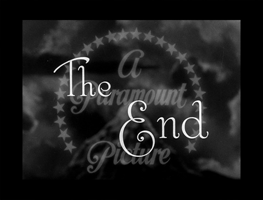
[We finish our conversation by looking for footage of the Academy Awards ceremony. We find this newsreel footage. I believe Preston Sturges to be the uneasy-looking man with moustache center frame at 0:07.]
[I have since found this site where you can preview the complete original unedited takes for that newsreel, at higher resolution. Here is the audience pan: Sturges is at 0:31, and again, dutifully clapping, at 2:05. Many many other fun things to see in there too (including, at the end, a little bit of how the actual ceremony looked). And do check out all the other bits of footage as well, the awkward restagings for the sound camera: behind-the-scenes authenticity peeks through around the edges.]
